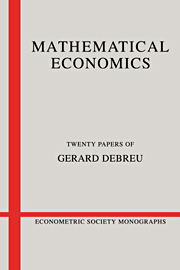Book contents
- Frontmatter
- Introduction
- 1 The coefficient of resource utilization
- 2 A social equilibrium existence theorem
- 3 A classical tax-subsidy problem
- 4 Existence of an equilibrium for a competitive economy
- 5 Valuation equilibrium and Pareto optimum
- 6 Representation of a preference ordering by a numerical function
- 7 Market equilibrium
- 8 Economics under uncertainty
- 9 Topological methods in cardinal utility theory
- 10 New concepts and techniques for equilibrium analysis
- 11 A limit theorem on the core of an economy
- 12 Continuity properties of Paretian utility
- 13 Neighboring economic agents
- 14 Economies with a finite set of equilibria
- 15 Smooth preferences
- 16 Excess demand functions
- 17 The rate of convergence of the core of an economy
- 18 Four aspects of the mathematical theory of economic equilibrium
- 19 The application to economics of differential topology and global analysis
- 20 Least concave utility functions
8 - Economics under uncertainty
Published online by Cambridge University Press: 05 January 2013
- Frontmatter
- Introduction
- 1 The coefficient of resource utilization
- 2 A social equilibrium existence theorem
- 3 A classical tax-subsidy problem
- 4 Existence of an equilibrium for a competitive economy
- 5 Valuation equilibrium and Pareto optimum
- 6 Representation of a preference ordering by a numerical function
- 7 Market equilibrium
- 8 Economics under uncertainty
- 9 Topological methods in cardinal utility theory
- 10 New concepts and techniques for equilibrium analysis
- 11 A limit theorem on the core of an economy
- 12 Continuity properties of Paretian utility
- 13 Neighboring economic agents
- 14 Economies with a finite set of equilibria
- 15 Smooth preferences
- 16 Excess demand functions
- 17 The rate of convergence of the core of an economy
- 18 Four aspects of the mathematical theory of economic equilibrium
- 19 The application to economics of differential topology and global analysis
- 20 Least concave utility functions
Summary
By a simple reinterpretation of the concept of a commodity, the classical economic theories of equilibrium and optimality can be extended, without change of form, to the case where uncertain events determine the consumption sets, the production sets, and the resources of the economy. According to the usual definition, a commodity is a good or service whose physical characteristics and date and place of delivery, are specified; in this article, the definition of a commodity also specifies an exogenous event (which will be known to have, or not to have, occurred by the delivery date). By agreement of the contracting parties, delivery of the commodity is conditional upon the occurrence of this event. This extended definition, which originated in the paper by K. J. Arrow at the May 1952 CNRS Colloquium on Risk, permits an immediate transposition of the results of economics under certainty to those of economics under uncertainty, thanks to the identity of forms already mentioned; it also has the advantage of leading to a theory of uncertainty that makes no reference to the notion of probability. Admittedly, there are no markets for the commodities as defined here, but economists are familiar with the fruitful hypothesis that there exist futures markets for all commodities, although only an insignificant number of such markets are observed.
- Type
- Chapter
- Information
- Mathematical EconomicsTwenty Papers of Gerard Debreu, pp. 115 - 119Publisher: Cambridge University PressPrint publication year: 1983



